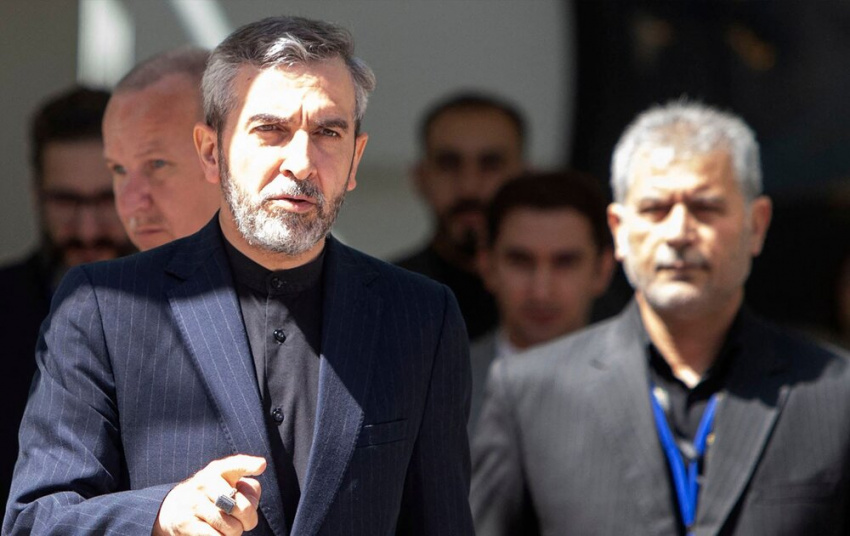Vienna talks end with proposal on table

The European and Iranian delegations left Vienna for the capitals. The Iranian team said they will remain in touch with the European Union.
An Iranian foreign ministry official told IRNA that on Monday that Enrique Mora, the EU coordinator for the talks, presented some ideas on the remaining issues to the parties.
“We conveyed our initial response and reservations as soon as we received them. But these items require a comprehensive review and we’ll convey our additional views to the coordinator and others,” the official said.
The official also said that progress was achieved on some subjects.
“Undoubtedly, the principled policy for us is to protect the rights and interests of the Iranian nation. Realizing these rights and providing benefits and ensuring the sustainable implementation of the other party's commitments and preventing the repetition of illegal U.S. behavior are the serious concerns of the negotiating team,” the official reiterated.
Meanwhile, a senior EU diplomat told IRNA that the negotiators now have a text.
“We have produced a text. What happens now depends on the response of the participants on the whole text,” the diplomat added.
On Sunday, Mora told IRNA, “We are advancing and I expect we will close the negotiations soon.” The comments raised optimism among political pundits.
A major hurdle in reaching an agreement was closing all International Atomic Energy Agency’s unsubstantiated claims over Iran’s civilian nuclear program. Tehran had demanded the closure of the Safeguards and the PMD cases.
According to Politico, Western diplomats involved in the negotiations in Vienna said that over the past five days, parties negotiated a separate political deal with Iran that could help close the probe.
“According to one senior Western official, that deal will see the 35-member IAEA Board of Governors pass a resolution closing the probe into the nuclear material, if Tehran provides answers on the origin of the uranium traces that are deemed credible by the IAEA,” Politico wrote on Monday.
In his phone call with United Nations Secretary General Antonio Guterres on Sunday, Iran’s Foreign Minister Hossein Amir Abdollahian reiterated Iran’s cooperation with the IAEA.
“Iran’s cooperation with IAEA continues. The Agency needs to fully resolve remaining Safeguards issues in a technical procedure and away from unconstructive political issues,” Amir Abdollahian noted.
Meanwhile, AFP quoted European diplomats as saying that the final draft tabled is non-negotiable, and “stretches us all to the limits of our flexibility.”
Wall Street Journal correspondent Laurence Norman said on Monday that according to a senior EU official, EU foreign policy chief Josep Borrell will send messages to participants setting out next steps for text.
An advisor to the Iranian delegation, Mohammad Marandi, said that Tehran will study the amended proposals.
“The EU's proposed ideas alongside other contributions to resolve remaining issues were discussed. Iran will continue constructive engagement by studying today's amended proposals. The role of the coordinator is crucial, but it is for the parties to decide on a future final text,” Marandi wrote on his Twitter account on Monday.
“The ball is in the U.S. court. Its failure to honor commitments and its continuation of Trump's malign legacy, necessitates a VERY carefully tailored text. Any agreement must rest on a solid foundation, underpinned by unambiguous language, and guarantee unimpeded implementation,” he continued.
Meanwhile, Russia’s top negotiator emphasized the text is “final.”
“BREAKING NEWS! The #EU Coordinator circulated ‘the final text’ of the draft decision on restoration of the #JCPOA. The participants in the #ViennaTalks now need to decide if the draft is acceptable for them. In case of no objection the nuclear deal will be restored,” Ulyanov wrote on his Twitter late on Monday.
Later, he told BBC that solutions to resolve the Safeguards file are within reach.
Iran will comprehensively study the modified text on the table, so will others. Yet, the important issue is not to be trapped by artificial deadlines set by Western media. Of course, time for a decision will not remain open-ended. Iran has shown the necessary flexibility, and it is high time the U.S. take a decision. A difficult decision.
Source: Tehran Times

